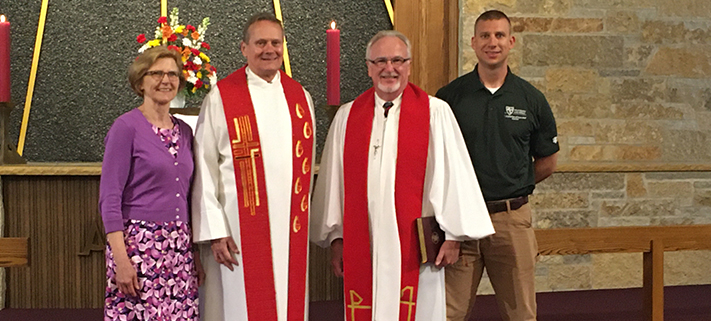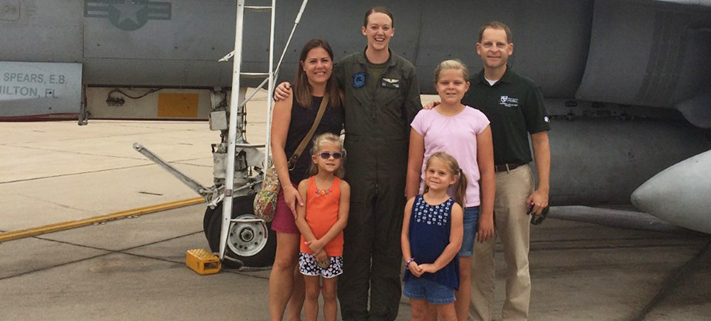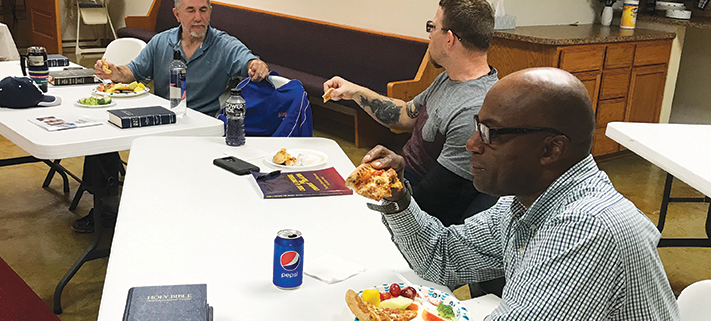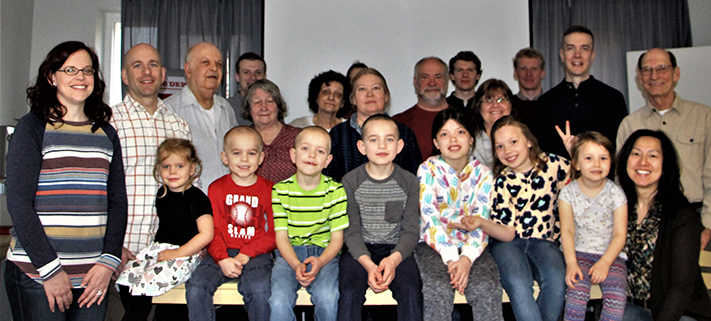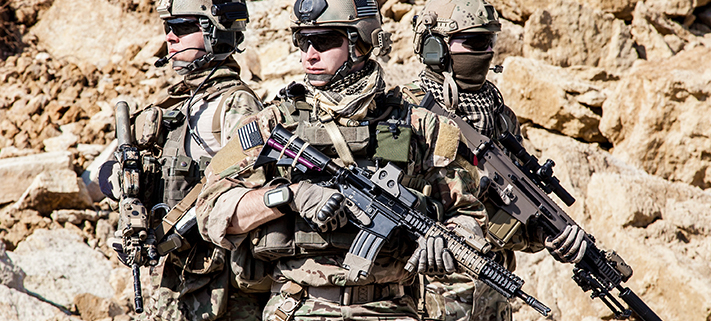Meeting the spiritual needs of WELS members in the military
In early February, WELS Military Services National Civilian Chaplain Rev. Paul Horn completed a trip to the southeastern United States to visit military bases and WELS congregations to learn more about life in the military and present information about WELS Military Services and how it serves WELS members in the military. As the national civilian chaplain, Horn’s role is to serve as the liaison to the military as well as orient, train, and mentor WELS military contact pastors around the country.
Horn’s first stop was Abiding Grace, Mobile, Ala., which is close to a Coast Guard pilot training center. Abiding Grace is home to many veterans and actively serving military members. Abiding Grace’s pastor, Rev. Tom Spiegelberg, serves as a military contact pastor to WELS members on base.
After a stop at Zion, Gainesville, Fla., to present at a circuit meeting that included two military contact pastors, Horn made his way to Savannah, Ga., where he toured the US Army Ranger training facilities. While in Georgia, Horn was able to shadow WELS member LTC Michael Hefti, battalion commander at Fort Stewart, for a day, opening his eyes to the stressors a military family faces.
Horn’s final stop was Hope, Irmo, S.C. While at Hope, Horn met with an Air Force veteran for Distinctive Religious Group Leader (DRGL) training, a program that allows lay members or civilian clergy the opportunity to represent their faith group and serve their people through Word and sacrament. With this training, this veteran will be able to lead Lutheran worship and Bible studies for the Army recruits at Fort Jackson, S.C.
“One of the ways the military allows WELS to provide Word and sacrament to members on bases is to train WELS pastors and laypeople to be religious lay leaders,” says Horn. “While they don’t always have full access to WELS military members—it depends on the installation, the chaplain, or commanding officer—it is a foot in the door in meeting the spiritual needs of WELS members in the military.”
Because WELS does not endorse chaplains, technically WELS is not a Distinctive Religious Group as recognized by the Department of Defense, but when WELS members enlist or commission as officers, they can indicate their religious preference. If WELS is the designated religious preference and religious accommodation is requested, it’s possible to access WELS worship.
Horn emphasizes that it is also important for military members to sign up with WELS Military Services at wels.net/refer. Once a service member signs up, they’ll be put in contact with the nearest WELS church and pastor.
Religious accommodation in action
Our Savior in San Antonio, Texas, is an example of a congregation that makes use of the religious accommodations on base. The congregation is near the Air Force base that conducts all the Air Force basic training. Rev. Micah Koelpin, pastor of Our Savior’s west campus, and Mr. David Kasischke, Our Savior’s staff minister, share the duties of once-per-month WELS worship services on base.
Kasischke shares what worship on base is like:
“The worship services we conduct are currently held on JBSA-Lackland here in San Antonio, in the Gateway Chapel’s conference room. We are billed as ‘Evangelical Lutheran (Wisconsin Synod),’ and we meet on the third Sunday of every month at 3:30 p.m. I use an order of service from our hymnal to ensure the worshipers, Air Force basic trainees, get the evangelical Lutheran experience. Usually, the ratio of non-WELS versus WELS is high . . . there are many more non-WELS people who attend. Some are curious about what an ‘evangelical Lutheran’ service looks like, and some are attending because they are ’wingmen’—the escort that is required because basic trainees do not go anywhere unaccompanied. Attendance is always unpredictable. My largest group was 19; then there have been times where it has only been a small handful. I always have the Lord’s Supper ready for any WELS member who attends. We practice close communion, but I explain why we do it this way and invite people to stay and participate in the other parts of the short communion service that I lead afterward. These services bring in people from all walks of faith life—unbelievers, doubters, curiosity-seekers, people who identify as ‘Christian’ but really know very little about their faith as well as Lutherans of other synods and members of other Christian denominations. I always take time to walk through the worship service and explain what each part is and why we do it when we do it in the worship service. I also leave time for questions after the service, about the worship itself or faith in general. I have found the questions are thoughtful and heartfelt.”
Opportunities to worship together and receive the sacrament are vitally important, says Kasischke. “What I have gathered from my conversations with these young people is that despite how well prepared you are, there is an adjustment to being away from home, loved ones, and the entire support network you are used to.”

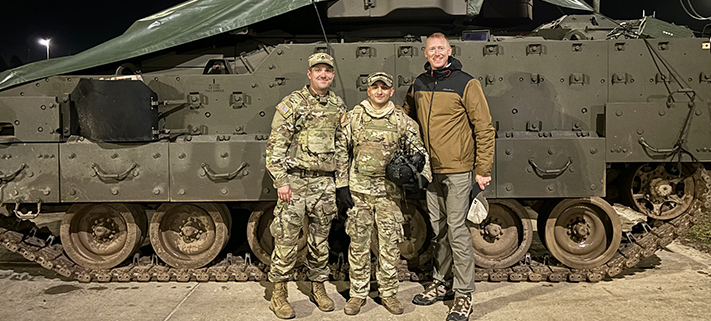
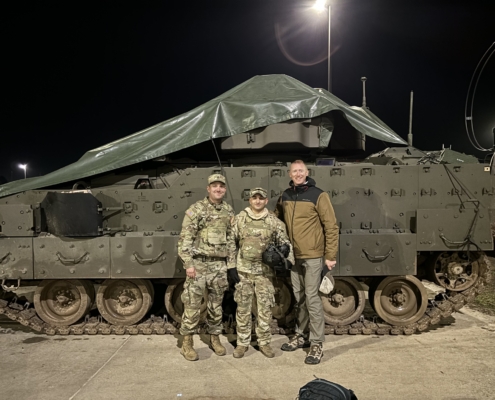
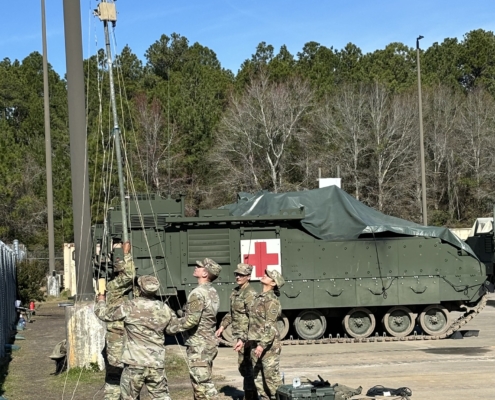
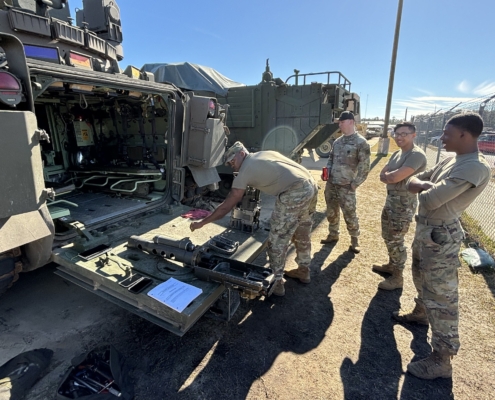
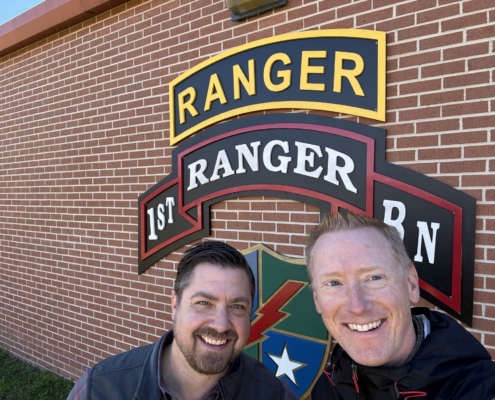
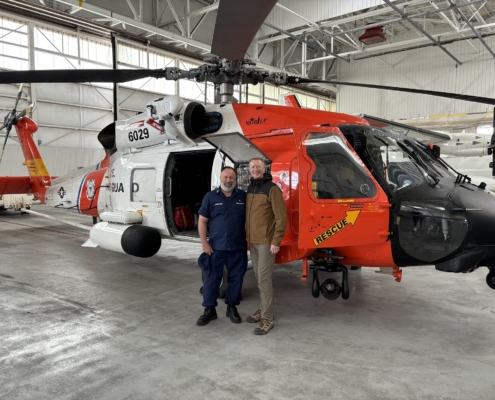
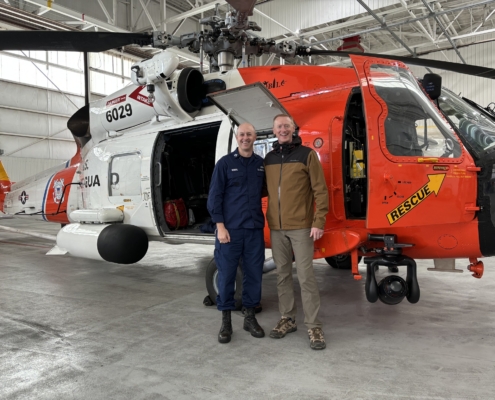
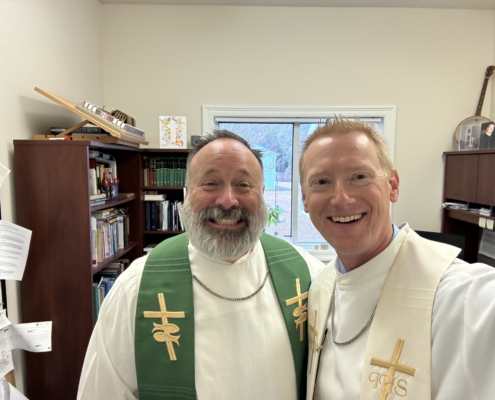
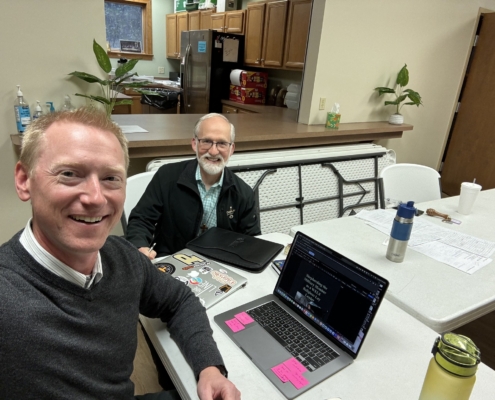
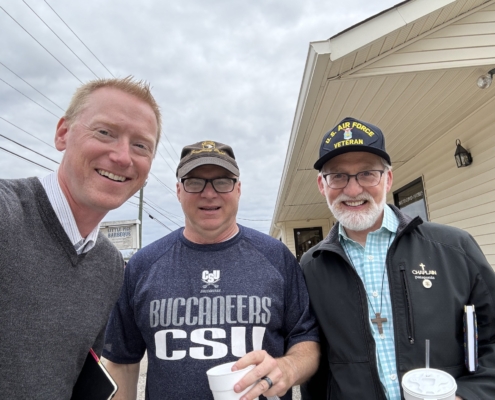
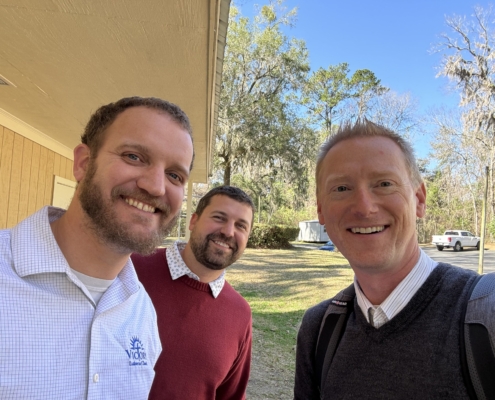
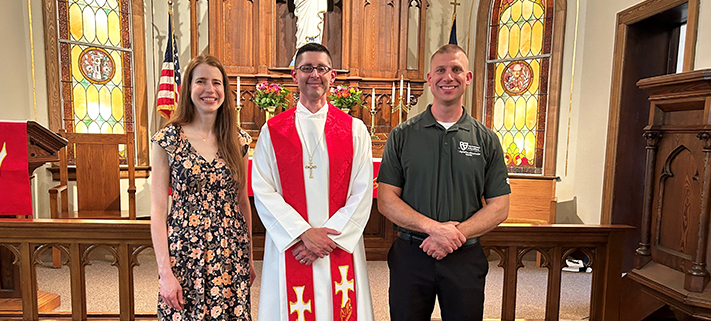
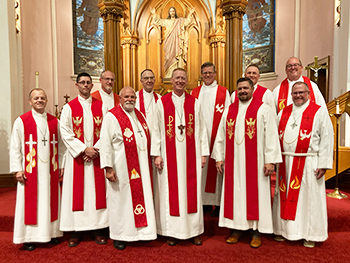 Horn was commissioned at Grace, Milwaukee, Wis. Horn has been involved with military ministry for 19 years, beginning with his first assignment after graduation to Faith in Radcliff, Ky., where he served as a military contact pastor. He has served on the WELS Military Services Committee since 2013. Horn and his wife, Rebecca, are in the process of moving from Lafayette, Ind., where he served as pastor at Lamb of God, to San Diego, Calif. He expects to begin his call as national civilian chaplain in San Diego in September, where he will not only serve as the liaison to the military, but also orient, train, and mentor WELS military contact pastors around the country.
Horn was commissioned at Grace, Milwaukee, Wis. Horn has been involved with military ministry for 19 years, beginning with his first assignment after graduation to Faith in Radcliff, Ky., where he served as a military contact pastor. He has served on the WELS Military Services Committee since 2013. Horn and his wife, Rebecca, are in the process of moving from Lafayette, Ind., where he served as pastor at Lamb of God, to San Diego, Calif. He expects to begin his call as national civilian chaplain in San Diego in September, where he will not only serve as the liaison to the military, but also orient, train, and mentor WELS military contact pastors around the country.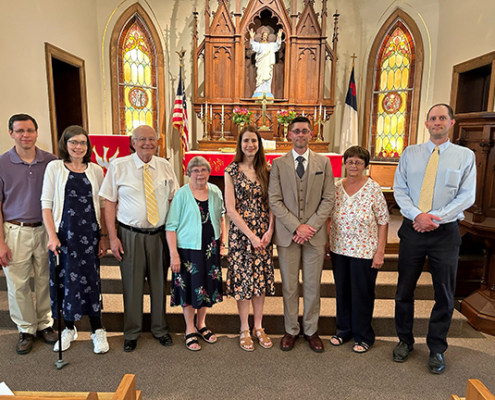
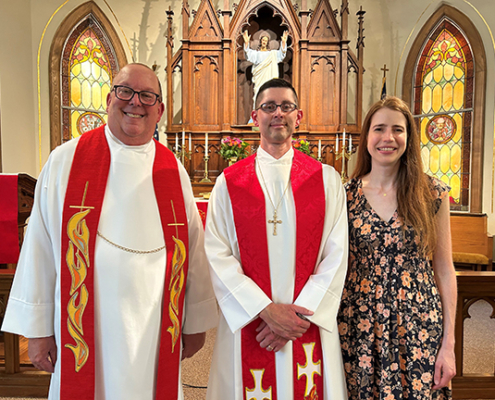
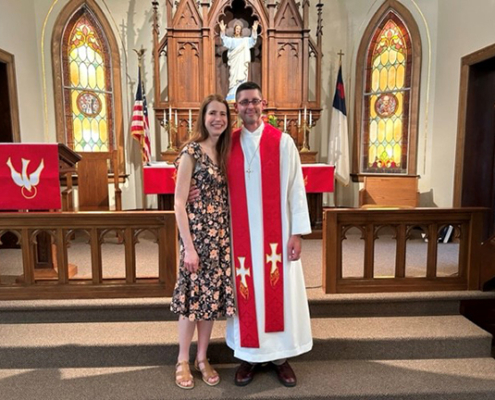
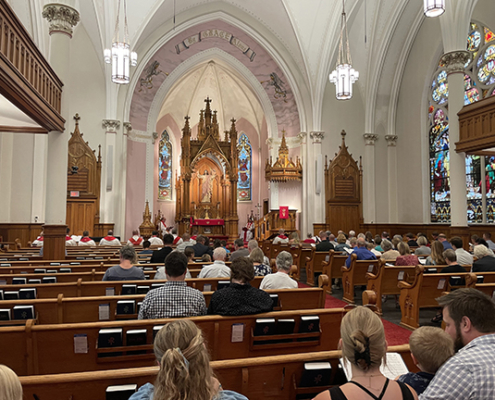
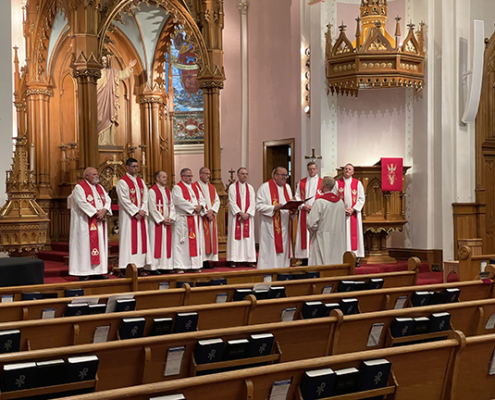
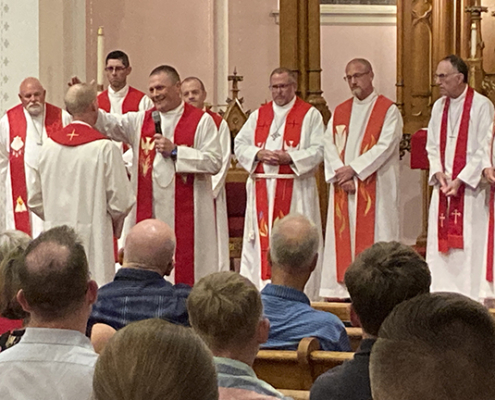
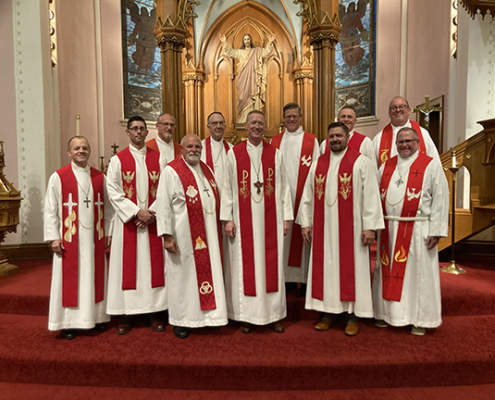
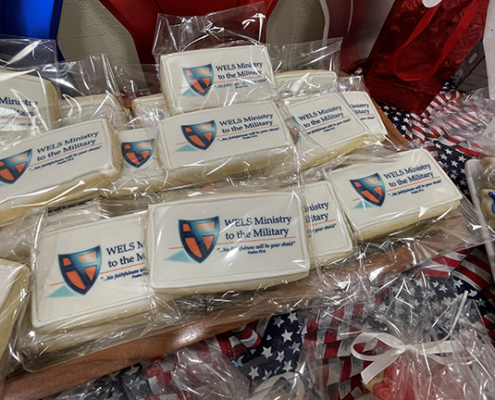
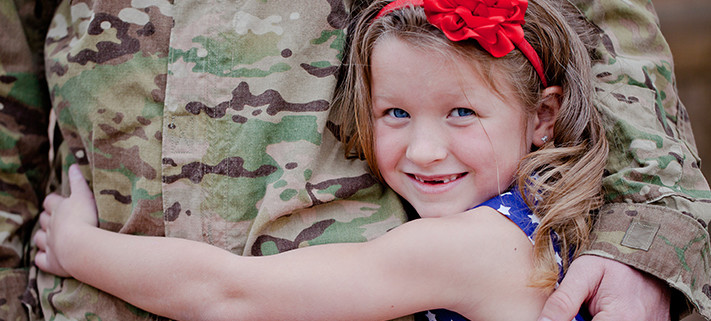
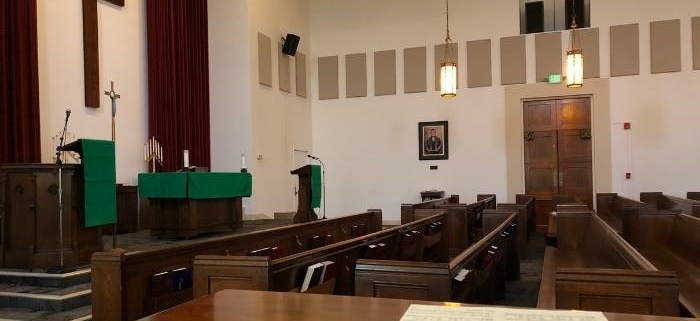
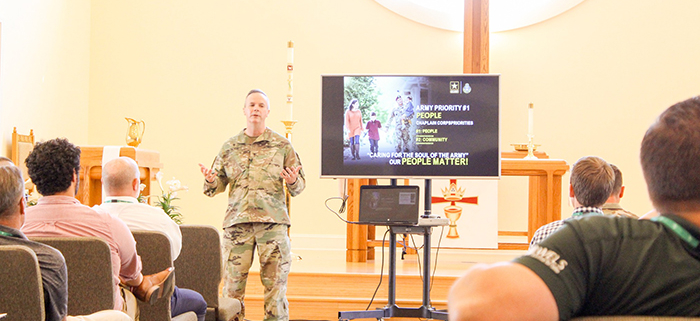
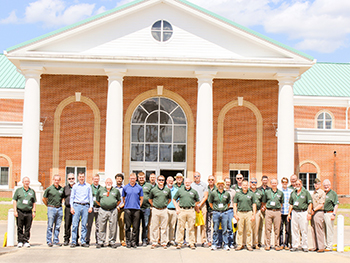 April 26-28, the WELS Military Services Committee held its annual Military Contact Pastors Workshop at Risen Savior, Pooler, Ga., near Army Fort Stewart and Hunter Army Airfield. Members of the Military Services Committee met with a group of WELS Military Contact Pastors to discuss ministry to the military with Fort Stewart chaplains and military personnel, including WELS members Lt. Col. Michael Hefti and his wife Katie, who described the stresses of military life and the importance of their WELS pastors and church family in supporting them spiritually.
April 26-28, the WELS Military Services Committee held its annual Military Contact Pastors Workshop at Risen Savior, Pooler, Ga., near Army Fort Stewart and Hunter Army Airfield. Members of the Military Services Committee met with a group of WELS Military Contact Pastors to discuss ministry to the military with Fort Stewart chaplains and military personnel, including WELS members Lt. Col. Michael Hefti and his wife Katie, who described the stresses of military life and the importance of their WELS pastors and church family in supporting them spiritually.